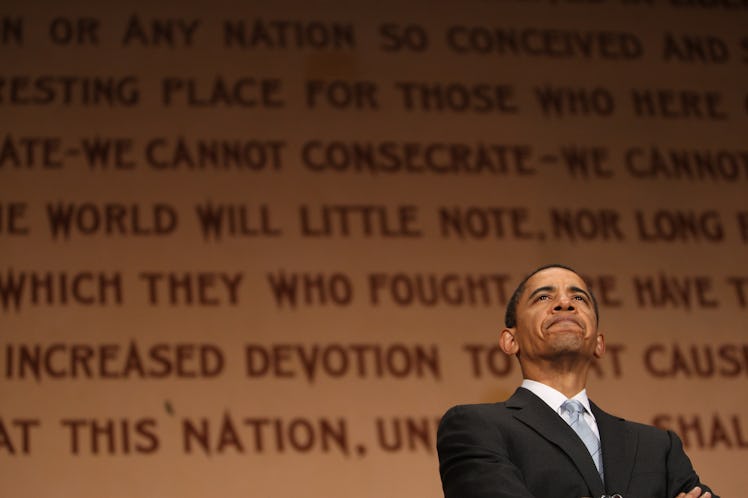
Barack Obama Shared Some Very Specific Advice About Action After George Floyd's Death
As public rage over the killings of black Americans, often at the hands of police, continues to escalate, protests around the country are growing as well. In Minneapolis, New York, Boston, Philadelphia, and other cities, protesters are turning out to call for an end to police violence and racism, all in the middle of the ongoing coronavirus pandemic. While responses from public leaders have run the gamut, one major public figure got extra specific on Monday, June 1. Former President Barack Obama's advice on protesting and action includes some important, concrete steps to help you figure out what you can really do to make change happen on both a personal level, and for your community.
The latest round of protests against police brutality and racism began the week of May 25, after the death of George Floyd, a black man, while in police custody in Minneapolis. Video of the incident showed a white officer, identified as Derek Chauvin, kneeling on Floyd's neck while Floyd repeated "I can't breathe." Court documents later alleged Chauvin had his knee on Floyd's neck for nearly nine minutes. Chauvin and three other officers involved were later fired from the Minneapolis Police Department, and Chauvin has since been charged with third-degree murder and manslaughter. Elite Daily attempted to reach representatives of Chauvin for comment on the charges, but did not receive a response. In the week since Floyd was killed, protests have sprung up around the country, with some turning violent or destructive. Reports have suggested at least some of the damage may be caused by instigators and looters unaffiliated with the main protest. Police have also been blamed for escalating the violence, with reports of officers using tear gas, pepper spray, and rubber bullets on protesters.
While Obama has weighed in on the situation before, on June 1 he published an in-depth message on Medium. In the post, entitled "How to Make this Moment the Turning Point for Real Change," Obama gave a light scolding to those instigating violence, and shared his sympathies with those who see the protests as their only remaining option to be heard on the subject of racial violence. "The waves of protests across the country represent a genuine and legitimate frustration over a decades-long failure to reform police practices and the broader criminal justice system in the United States," he wrote.
Importantly, Obama also shared concrete advice on what people can do to make sure the change they're calling for sticks. He emphasized that protests have often been the only way for marginalized communities to make authorities take their demands seriously. But, he said, "eventually, aspirations have to be translated into specific laws and institutional practices — and in a democracy, that only happens when we elect government officials who are responsive to our demands." He continued,
The elected officials who matter most in reforming police departments and the criminal justice system work at the state and local levels. ... Unfortunately, voter turnout in these local races is usually pitifully low, especially among young people — which makes no sense given the direct impact these offices have on social justice issues, not to mention the fact that who wins and who loses those seats is often determined by just a few thousand, or even a few hundred, votes. So the bottom line is this: if we want to bring about real change, then the choice isn’t between protest and politics. We have to do both.
Obama specifically noted that officials like mayors and county executives appoint police chiefs, while officials like district and state attorneys are the ones who make the call to investigate and charge (or not) officers accused of misconduct or violence. "Those are all elected positions," he wrote. Turning out to vote for these local elections, he said, would mean putting the right people in charge to follow through on the policies and change that protesters demand.
He also advised activists to think critically about what change they want to see, and make sure it's tailored to their own community. "[T]he more specific we can make demands for criminal justice and police reform, the harder it will be for elected officials to just offer lip service to the cause and then fall back into business as usual once protests have gone away," he wrote. Prior to his life in national politics, Obama worked as a grassroots community organizer in Chicago.
The current protests are only the latest in the ongoing movement protesting the deaths of black Americans, often at the hands of police. The Black Lives Matter movement and protests gained national recognition in 2014 after the killings of Trayvon Martin, Michael Brown, and Eric Garner, and gained steam after deaths like those of Sandra Bland, Philando Castile, Freddie Gray, and dozens more in subsequent years. In recent weeks, another rash of killings prompted a fresh round of outrage about racial bias and policing, after the deaths of Ahmaud Arbery in Georgia, and Breonna Taylor in Kentucky.
If you're already planning how to follow Obama's advice, you can start by looking up your local elections. You can also find a sample ballot for your next election at Ballotpedia by simply entering in your full address. And of course — make sure you're registered to vote.